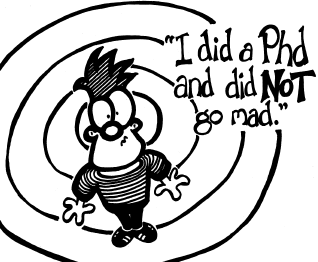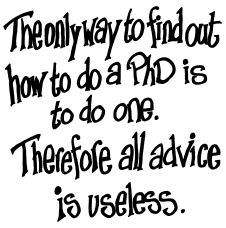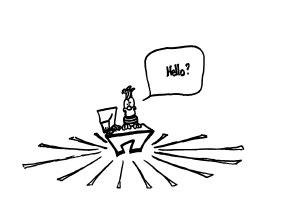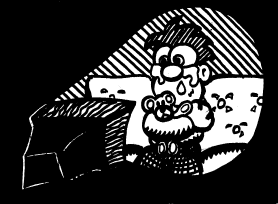
 |
I did a PhD and did NOT go mad |

To say that I enjoyed doing my PhD would be a lie, not just an ordinary lie mind you. More the sort of lie one would normally associate with Tory party conferences. A big wobbly lie with a dusting of sugar on top. At times I hated my PhD, so why do I have any authority to give advice on doing a PhD? Well, I don't claim to have any -- other than the fact that I completed and passed the thing, so I must have done somthing right.
This page is an attempt to...
In most departments there's always one smartarse who loudly proclaims that doing a PhD is easy and he (its usually a he) can't see what all the fuss is about, and he's just written another three chapters this morning, and he's submitted another five journal articles. People like this are lying, showing off, from Mars or over-compensating for inadequacies in other areas of their lives (if-you-know-what-I-mean). Ignore them.
 The next
big surprise for people who are starting PhDs after an undergraduate degree is
just how excrutiatingly lonely a PhD is. When you submit your thesis you have to
sign a piece of paper that says `This is my work, my work alone, nobody else's,
all mine, nobody but me did it. Honest.' A PhDs is so narrow and focused that
the chances are that you and only you is going to understand anything about it.
This is known as the Loneliness of the Long Distance Researcher and you have to
get used to it. It means you're going to spend at least three years wandering
around with a great chunk of bizarre, irrelevent nonsense in your head that only
you can relate to. Get used to people's eyes glazing over and them shuffling in
their seats when you try to explain exactly what it is you're doing. Try to
avoid emotional entanglements with people who say `penny for your thoughts'
during romantic moments. If, like me, you say `the problem of formally refining
liveness properties stated in a temporal logic for reactive systems' then you're
likely to find yourself rapidly emotionally unentangled. Or at least they ask
for a full refund on their penny with a written apology. Anyway, quite frankly,
after a couple years of doing my PhD the last people I wanted to spend any time
with were the sort of people who would be remotely interested in my work. To
quote Groucho Marx `I wouldn't want to join a club that would have me as a
member.'
The next
big surprise for people who are starting PhDs after an undergraduate degree is
just how excrutiatingly lonely a PhD is. When you submit your thesis you have to
sign a piece of paper that says `This is my work, my work alone, nobody else's,
all mine, nobody but me did it. Honest.' A PhDs is so narrow and focused that
the chances are that you and only you is going to understand anything about it.
This is known as the Loneliness of the Long Distance Researcher and you have to
get used to it. It means you're going to spend at least three years wandering
around with a great chunk of bizarre, irrelevent nonsense in your head that only
you can relate to. Get used to people's eyes glazing over and them shuffling in
their seats when you try to explain exactly what it is you're doing. Try to
avoid emotional entanglements with people who say `penny for your thoughts'
during romantic moments. If, like me, you say `the problem of formally refining
liveness properties stated in a temporal logic for reactive systems' then you're
likely to find yourself rapidly emotionally unentangled. Or at least they ask
for a full refund on their penny with a written apology. Anyway, quite frankly,
after a couple years of doing my PhD the last people I wanted to spend any time
with were the sort of people who would be remotely interested in my work. To
quote Groucho Marx `I wouldn't want to join a club that would have me as a
member.'
Many departments have well integrated research programs with seminars and meetings and other such social gatherings. This is A Good Thing and will go a long way in relieving the loneliness of the long distance researcher. Many departments are, however, abysmal in this respect. If you're an active go-getting sort of person you may try sorting out social gatherings but be prepared for knockbacks. I did my best to get my colleagues down the pub, but the world record for number of research students in one pub at the same time was (from memory) nine out of forty -- and that was only when two Christmas parties accidentally went in the same pub at the same time. Remember, if you can't persuade other researchers to leave the sanctity of their computer screens and come down the pub its probably not your fault -- they've probably forgotten what a pub is, what you do in one and why. When you start your PhD you'll probably think that they're a sad bunch of herberts, but believe me, by the time you've spent three years doing a PhD you'll have a lot more sympathy for them.
 There are
going to be times when it all gets to you and you can't cope any more. (The day
I found a paper that I'd missed in my literature survey that covered all the
`new' stuff I'd done in the previous nine months was my own personal nadir.)
What do you do in such circumstances?
There are
going to be times when it all gets to you and you can't cope any more. (The day
I found a paper that I'd missed in my literature survey that covered all the
`new' stuff I'd done in the previous nine months was my own personal nadir.)
What do you do in such circumstances?
Cry.
Your eyes out.
Since the tragic death of the Princess of Wales we all now know how to express our negative emotions fulsomely and publicly without caring a jot. So forget your stiff upper lip and let it tremble. But don't waste that outpouring of emotion -- make it count as much as possible. In a sentence, burst into tears in your supervisor's office. If you're really determined to gain dramatic effect then wait until he/she's entertaining some important guests -- Profs from other universities or co-authors on important papers. However if your supervisor is one of those `My door's always open' types who spend all year at conferences in the Yemen or can't be seen without booking two months in advance with his secretary then you may have problems. An email isn't very effective in this case...
To: Prof Vacation [vacate@never.here.ac.uk] From: Hopeless inadequate useless bag of rubbish [self_pity@here.now.ac.uk] Subject: Bleeeeeaaaah! Dear Prof, Boooooohoooooo, snivel, snivel, bleeeeaaaaaah... /END MESSAGE |
Its not the same is it?
 While we're on the subject of dealing with
emotional catasphrophes I should mention the crucial role that chocolate played
(and is still playing) in my academic career. There is no problem known to
science that cannot be cured by the liberal application of chocolate. Leading
doctors have testified to its mystical curative powers -- it is known to contain
all sorts of wholesome, bracing chemicals that get straight to the happiness
centres of your brain and get them working at full pitch, scattering love and
joy and contentment all through your cortex. Leading dieticians and skin care
specialists may make the odd carping comment, but take no notice. Just consider
the following scientific breakthroughs directly attributed to chocolate...
While we're on the subject of dealing with
emotional catasphrophes I should mention the crucial role that chocolate played
(and is still playing) in my academic career. There is no problem known to
science that cannot be cured by the liberal application of chocolate. Leading
doctors have testified to its mystical curative powers -- it is known to contain
all sorts of wholesome, bracing chemicals that get straight to the happiness
centres of your brain and get them working at full pitch, scattering love and
joy and contentment all through your cortex. Leading dieticians and skin care
specialists may make the odd carping comment, but take no notice. Just consider
the following scientific breakthroughs directly attributed to chocolate...
 There are
of course several methods of stress relief to be tried -- popular ones include
Staring Out of Windows and Watching Old Black and White Films. Obviously with
minimum effort you can combine these with Eating Chocolate for a previously
unprecedented amount of stress relief. It is more difficult to combine Staring
Out of Windows and Watching Old Black and White Films though, at least not
unless you put your telly outside your window. (Not recommended during inclement
weather or for those in high rise buildings.) I have been advised on medical and
moral grounds not to include Getting Monsterously Bladdered and Uncomplicated
Sex in my list of stress relievers, but you'd probably thought of those already.
There are
of course several methods of stress relief to be tried -- popular ones include
Staring Out of Windows and Watching Old Black and White Films. Obviously with
minimum effort you can combine these with Eating Chocolate for a previously
unprecedented amount of stress relief. It is more difficult to combine Staring
Out of Windows and Watching Old Black and White Films though, at least not
unless you put your telly outside your window. (Not recommended during inclement
weather or for those in high rise buildings.) I have been advised on medical and
moral grounds not to include Getting Monsterously Bladdered and Uncomplicated
Sex in my list of stress relievers, but you'd probably thought of those already.
 In order
to not become entirely divorced from reality it is a good idea to get a hobby
and the less your hobby has to do with the subject of your PhD the better. If
you are considering doing a PhD on a subject you really enjoy and find
fascinating then beware -- the chances are that after three or so years of
studying nothing but your chosen topic you'll hate the very mention of its name.
Do you really want this? My PhD was in a Bizarre Corner of Computer Science and
during my PhD some of the hobbies I'm willing to admit to are learning to play
the mandolin, taking watercolour lessons, going on some very long walks and
sewing. My chocolate consumption skills also improved dramatically as I think I
may have mentioned elsewhere.
In order
to not become entirely divorced from reality it is a good idea to get a hobby
and the less your hobby has to do with the subject of your PhD the better. If
you are considering doing a PhD on a subject you really enjoy and find
fascinating then beware -- the chances are that after three or so years of
studying nothing but your chosen topic you'll hate the very mention of its name.
Do you really want this? My PhD was in a Bizarre Corner of Computer Science and
during my PhD some of the hobbies I'm willing to admit to are learning to play
the mandolin, taking watercolour lessons, going on some very long walks and
sewing. My chocolate consumption skills also improved dramatically as I think I
may have mentioned elsewhere.
Further reading...  If PhD horror stories particularly interest you and
you feel it a subject worthy of further investigation then you should have
a look here. If PhD horror stories particularly interest you and
you feel it a subject worthy of further investigation then you should have
a look here. |
© 2001 Richard Butterworth.